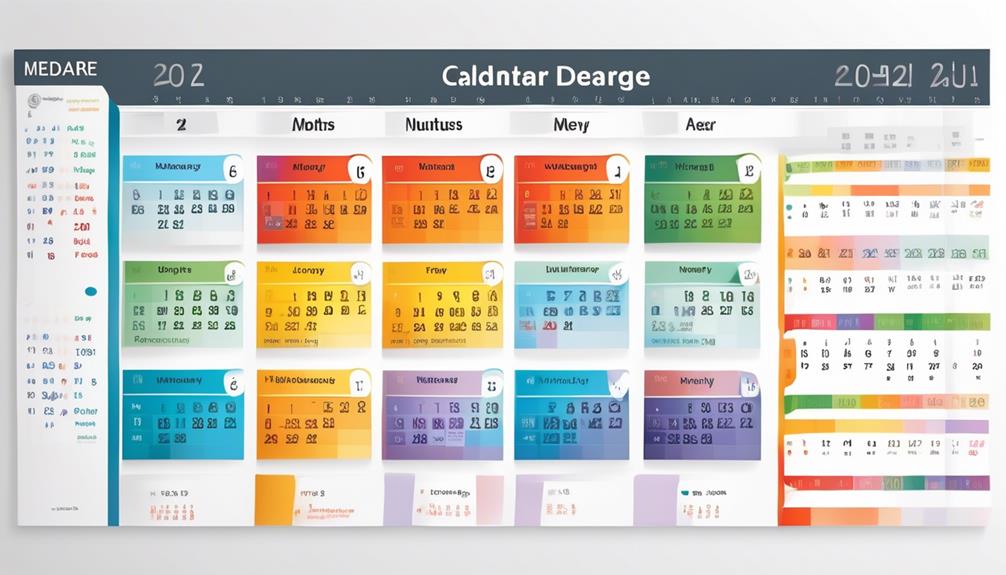Picture yourself navigating the intricate maze of healthcare options, and envision a useful tool that guides us to the best time to enroll in Medicare.
The question lingers: when is the optimal moment to take this crucial step?
Understanding the nuances of eligibility, enrollment periods, and coverage start dates can be pivotal in securing seamless healthcare transitions.
Let's explore the intricacies of Medicare application timing to ensure we make informed choices for our future well-being.
Key Takeaways
- Apply at least 4 months before turning 65.
- Understand different enrollment periods to avoid penalties.
- Know start dates for Part A and B coverage.
- Timely application is crucial for seamless Medicare enrollment.
Enrollment Periods for Medicare
Discussing the Enrollment Periods for Medicare is crucial for understanding when individuals can apply for coverage and potential penalties for late enrollment. The Initial Enrollment Period, lasting seven months, begins three months before turning 65 and ends three months after. Missing this window can lead to late enrollment penalties for Medicare coverage.
The General Enrollment Period runs from January 1 to March 31 annually, with coverage commencing the following month after enrollment.
Special Enrollment Periods are available post the Initial Enrollment Period for specific qualifying situations. These periods exempt individuals from late enrollment penalties, providing a limited time window to sign up for Medicare without repercussions. Different criteria apply for each Special Enrollment Period, emphasizing the importance of understanding eligibility requirements.
It's essential to grasp these timelines to avoid penalties and ensure seamless access to Medicare coverage, including Medicare Advantage or contributions to a Health Savings Account. Individuals with ALS (also known as Lou Gehrig's disease) automatically qualify for a Special Enrollment Period, streamlining the process for them.
Medicare Coverage Start Dates

Understanding the specific start dates for Medicare coverage is essential for individuals approaching the age of 65 or considering enrolling in Medicare.
When it comes to Part A coverage, it typically starts the month you turn 65, with premium-free Part A kicking in the month before your 65th birthday. On the other hand, Part B coverage begins based on the month you sign up, with the coverage starting on the first day of that particular month.
If you decide to sign up for Part A after turning 65, the coverage will start six months back from your sign-up date. Being aware of these start dates for Part A and Part B is crucial for planning healthcare needs effectively.
Knowing when your Medicare coverage begins is vital for scheduling appointments, treatments, and managing healthcare costs efficiently. Planning ahead based on these start dates can help individuals make informed decisions regarding their healthcare needs.
Applying for Medicare: Process Overview
To apply for Medicare, individuals can utilize their Initial Enrollment Period, which spans three months before turning 65 and concludes three months after. Here is a simplified process overview:
- Check Automatic Enrollment: Confirm if you're automatically enrolled in Medicare. If not, proceed to apply.
- Apply Online: If you need to apply, you can do so conveniently through the Social Security Administration website.
- Apply for Part A and Part B: Most individuals apply for both parts of Medicare through the Social Security Administration to ensure comprehensive coverage.
- Timely Application: Applying on time is crucial to prevent coverage gaps and potential late enrollment penalties. Ensure you understand the deadlines and implications.
Starting Medicare Under Age 65

When considering Medicare enrollment for individuals under age 65, it's essential to understand the specific criteria and circumstances that enable eligibility for coverage. If you receive disability benefits from Social Security, you can automatically enroll in Medicare Parts A and B after 24 months. Those diagnosed with Lou Gehrig's Disease (ALS) are immediately enrolled in Medicare Parts A and B. If you have End-Stage Renal Disease (ESRD), exploring Medicare coverage and enrollment options is crucial.
Medicare ensures healthcare benefits to individuals under 65 with disabilities, providing timely access to necessary services. Understanding the enrollment process is vital for those seeking Medicare coverage before the age of 65. By grasping the rules and requirements, individuals can navigate the system efficiently and secure the healthcare benefits they need. Whether it's through Social Security disability benefits or specific medical conditions like ALS or ESRD, Medicare stands ready to support those in need.
Getting Started With Medicare
We recommend applying for Medicare at least four months before turning 65 to ensure timely coverage and access to essential healthcare services. Here are some key points to consider when getting started with Medicare:
- Initial Enrollment Period: This period starts three months before you turn 65 and ends three months after. It's crucial to apply during this window to avoid any gaps in coverage.
- Automatic Enrollment with Social Security benefits: If you're already receiving Social Security benefits before turning 65, you'll be automatically enrolled in Medicare.
- Avoiding Delays in Coverage: For those not receiving Social Security benefits, applying for Medicare in a timely manner is essential to prevent any delays in coverage and ensure you have access to necessary healthcare services.
- Understanding Deadlines and Potential Penalties: Familiarize yourself with the enrollment process, deadlines, and potential penalties associated with late enrollment to make informed decisions about your Medicare coverage.
Frequently Asked Questions
How Many Months Before Should I Apply for Medicare?
We recommend applying for Medicare at least 4 months before turning 65 to ensure timely coverage. Initiating the process early can prevent gaps in coverage and potential penalties for late enrollment.
Do I Automatically Get Medicare When I Turn 65?
Yes, we automatically get Medicare when we turn 65 if already receiving Social Security retirement benefits.
If not, we must enroll during the Initial Enrollment Period starting 3 months before turning 65.
Online applications are available for those not ready to receive Social Security benefits at 65.
It's crucial to understand our specific situation for timely coverage.
For individuals under 65 with certain disabilities, Medicare enrollment may occur after receiving Social Security disability benefits for a specific period.
What Are the 3 Requirements for Medicare?
When applying for Medicare, three key requirements must be met.
First, individuals must be U.S. citizens or legal residents for at least five continuous years.
Second, one needs to be age 65 or older, with exceptions for those with qualifying disabilities or medical conditions.
Lastly, individuals or their spouses must have worked and paid Medicare taxes for a minimum of 10 years to be eligible for Medicare benefits.
These requirements are crucial for Medicare eligibility.
When Can I Enroll in Medicare for 2024?
We can enroll in Medicare for 2024 during specific periods, ensuring timely access to coverage. Missing enrollment windows may lead to penalties and gaps in benefits. It's crucial to grasp the enrollment guidelines to make informed decisions.
Conclusion
In conclusion, it's advisable to consider enrolling in Medicare at the appropriate time to ensure seamless coverage and avoid any potential penalties.
Planning ahead and submitting your application in a timely manner can help facilitate a smooth transition into Medicare.
Remember, being proactive with your healthcare coverage can lead to a more favorable outcome in the long run.










